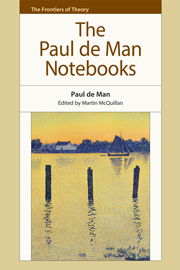Book contents
- Frontmatter
- Contents
- Series Editor's Preface
- Acknowledgements
- Dedication
- Introduction: ‘The Unimaginable Touch of Time’: The Public and Private in the Notebooks of Paul de Man
- PART I Texts
- PART II Translations
- PART III Teaching
- 17 Field of Comparative Literature: Analysis of Needs (1967)
- 18 The Comparative Literature Program at Rutgers University: A Report
- 19 Comparative Literature 816a: Hegel and English Romanticism
- 20 Comparative Literature 816a: Hegel and English Romanticism
- 21 Comparative Literature 817a: Aesthetic Theory from Kant to Hegel
- 22 Curriculum for Lit Z Proposal (1975)
- 23 Literature Z: Exercise II
- 24 Rhetorical Readings
- 25 Director's Report on Rhetorical Reading (1982)
- 26 Seminar on “Aesthetic Theory from Kant to Hegel”. Fall Semester, 1982
- PART IV Research
- Appendix. The Notebooks of Paul de Man 1963–83
- Bibliography
- Index of Names
26 - Seminar on “Aesthetic Theory from Kant to Hegel”. Fall Semester, 1982
from PART III - Teaching
Published online by Cambridge University Press: 05 December 2014
- Frontmatter
- Contents
- Series Editor's Preface
- Acknowledgements
- Dedication
- Introduction: ‘The Unimaginable Touch of Time’: The Public and Private in the Notebooks of Paul de Man
- PART I Texts
- PART II Translations
- PART III Teaching
- 17 Field of Comparative Literature: Analysis of Needs (1967)
- 18 The Comparative Literature Program at Rutgers University: A Report
- 19 Comparative Literature 816a: Hegel and English Romanticism
- 20 Comparative Literature 816a: Hegel and English Romanticism
- 21 Comparative Literature 817a: Aesthetic Theory from Kant to Hegel
- 22 Curriculum for Lit Z Proposal (1975)
- 23 Literature Z: Exercise II
- 24 Rhetorical Readings
- 25 Director's Report on Rhetorical Reading (1982)
- 26 Seminar on “Aesthetic Theory from Kant to Hegel”. Fall Semester, 1982
- PART IV Research
- Appendix. The Notebooks of Paul de Man 1963–83
- Bibliography
- Index of Names
Summary
September 8
This course is part of a cycle on aesthetic theory around Hegel. Precursor courses include: “Hegel's Aesthetics” and “Hegel and English Romanticism.”
We're concerned with the aesthetic as a philosophical category – a category in the Aristotelian sense. As a category, it is not something that one can be for or against; it is not open to valorization.
And, with the relationship of the category of the aesthetic to questions of epistemology in the existing general philosophical tradition.
And, to the elements of critical philosophy, which involves a testing of a variety of categories against an epistemological truth and falsehood.
Critical philosophy here is thus the testing of the categories in terms of questions of epistemology.
Historically, critical thought opposes the empirical – or more specifically, ideological thought – as, for instance, that of Condillac. There's an historical opposition of critical philosopher to ideologue. The term “ideology” was already in use in the eighteenth century.
As Foucault sets it up, critical philosophy overtakes the ideologues of the Enlightenment. This is not necessarily correct.
What we have here is an explicit philosophical theme: the relation of the category of the aesthetic to epistemology. The implicit question is the relation of the category of the aesthetic to the theory of language.
“Language” here means consideration of sign, symbol, trope, rhetoric, grammar, etc.
- Type
- Chapter
- Information
- The Paul de Man Notebooks , pp. 259 - 280Publisher: Edinburgh University PressPrint publication year: 2014



